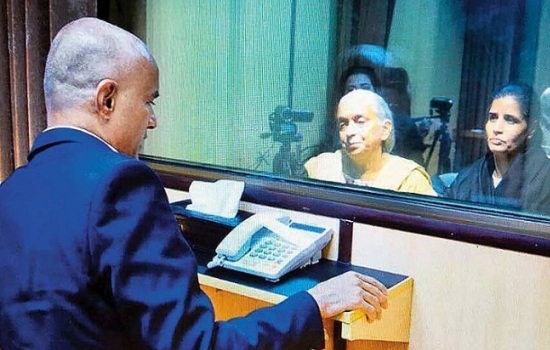By Rashi Jain-
On Friday, External Affairs Ministry spokesperson Anurag Srivastava addressed in a weekly virtual media briefing that the Pakistan government has failed to provide unimpeded consular access to Indian Navy officer Kulbhushan Jadhav.
“Pakistan has consistently failed to address the core issues in the implementation of ICJ judgment in Kulbhushan Jhadav’s case in its letter and spirit. These issues pertain to the provision of relevant documents as well as providing unimpeded consular access to Kulbhushan” – Anurag Srivastava
On 8th May 2017, India filed a petition in the International Court of Justice concerning dispute regarding death sentence given to Mr. Kulbhushan Sudhir Jadhav by Pakistan military court in April 2017. The military court sentenced Jadhav for the charges of espionage and terrorism and was arrested from Baluchistan in 2016. While India has rejected all the allegations and said that he was kidnapped from the Iranian port of Chabahar.
ICJ by an order dated 18th May 2017, “the Court directed Pakistan to “take all measures at its disposal” to ensure that Mr. Jadhav would not be executed pending a final decision in the case, and to inform the Court of all the measures taken in implementation of that Order. It also decided that, until the Court had given its final decision, it would remain seized of the matters which formed the subject matter of the Order.”
The International court then by the judgment dated 17th July 2019, “the Court concluded that the Vienna Convention was applicable in the case, regardless of the allegations that Mr. Jadhav was engaged in espionage activities. The Court observed that Pakistan did not contest India’s assertion that Mr. Jadhav had not been informed of his rights under Article 36, paragraph 1 (b), of the Convention, and thus concluded that Pakistan had breached its obligation under that provision. The Court then pointed out that Pakistan had notified India of Mr. Jadhav’s arrest and detention on 25 March 2016, some three weeks after his arrest; taking account of the particular circumstances of the case, the Court considered that Pakistan had thus breached its obligation to inform the consular post “without delay”, as required by Article 36, paragraph 1 (b), of the Vienna Convention. The Court, therefore, concluded that Pakistan had breached the obligations incumbent on it under Article 36, paragraph 1 (a) and (c), of the Vienna Convention, by denying India’s consular officers access to Mr. Jadhav, contrary to their right to visit him, converse and correspond with him, and arrange for his legal representation.”
Pakistan media in its recent report mentioned that the Pakistan government and Islamabad High Court have said that it has asked India to appoint a legal counsel for Jadhav. While the Indian officials claimed that Islamabad has not yet contacted them regarding any development of the case.
In the recent updates regarding the case, Islamabad High Court ordered to set up a three judges’ bench to hear the case. The new bench includes Chief Justice Athar Minallah, Justice Amir Farooq and Justice Miangul Hassan Aurangzeb. The next hearing in the Kulbhushan case is scheduled for September 3rd.

